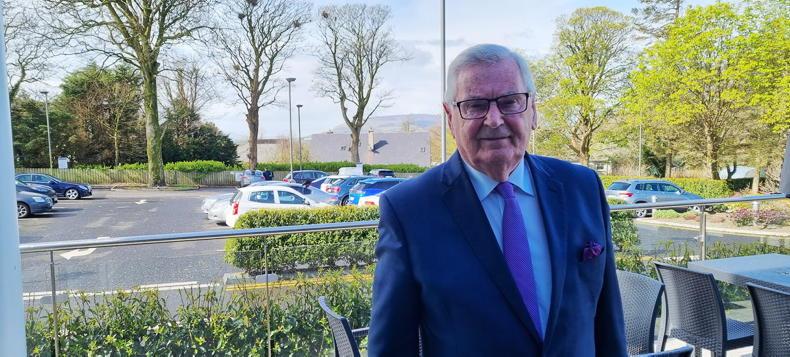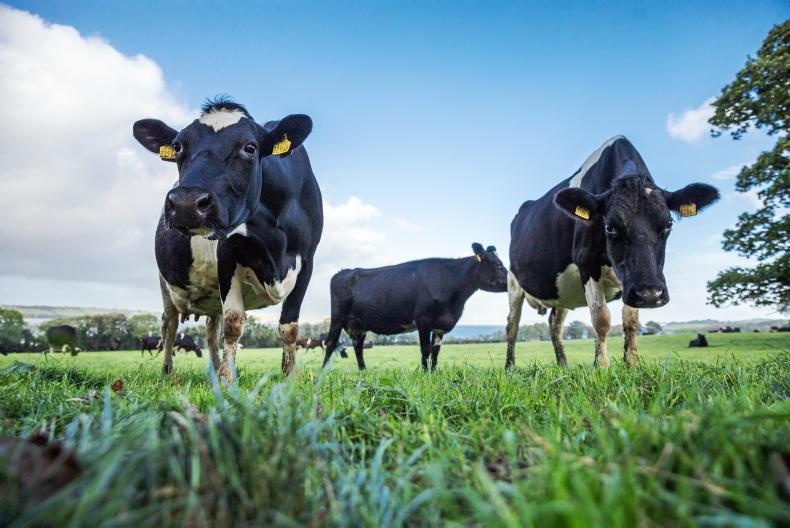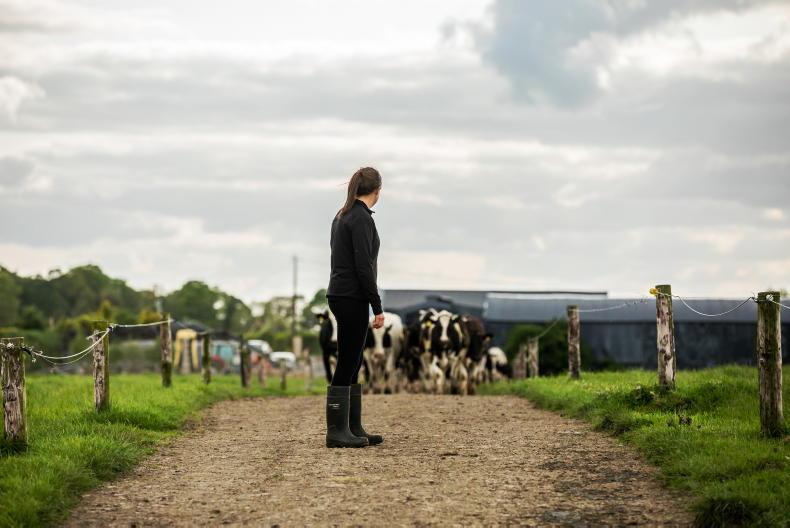Ray MacSharry could be described as the exception that proves the rule in politics in that he left on his own terms at the time of his choosing, though that was almost a decade later than he intended.
“I had planned to be out by the time I was 45 but I was 54 when I finished my term as Commissioner at the end of 1992,” he told the Irish Farmers Journal when interviewed about the first major reform of the CAP in 1992.
When Ray MacSharry was appointed European Commissioner for Agriculture in 1989, he was already well versed in both agriculture and finance.
His early career was spent as a cattle dealer moving into haulage, with his first political venture as a member of Sligo Corporation in 1967. This was followed by his election to the Dáil in 1969.
He became a junior minister for public services in the 1977 Fianna Fáil government and was appointed Minister for Agriculture from 1979 to 1981.
When Fianna Fáil was returned to government for a short period in 1982, Ray MacSharry became Minister for Finance. He was returned to this post in 1987 when the party was back in government, following a period in opposition. In between, he spent time as an MEP and was well acquainted with EU politics by the time he became Commissioner.
Preparing for the Commission
Ray MacSharry told the Irish Farmers Journal that on taking up the Commissioner’s job, his time as an MEP, Minister for Agriculture and, more recently, in finance made him particularly aware of the problems he faced. Beef mountains and milk lakes were the talk of the time and they were politically unsustainable.
He describes his first major challenge as trying to develop a culture of change. This included his own secretariat, DG VI, now DG Agri, and he faced a battle with the then EU 15 agriculture ministers in the Council to make the necessary changes. He had supporters amongst EU finance ministers, however.
His angle was that the proposed changes were not a desire to cut the CAP money but rather to facilitate the production of affordable food.
After all, the major issue of the day was the bulging cold stores and storage ships which were filled with product that was purchased by the EU at a high price, processed and stored by the EU before being sold off to third countries such as Russia for a fraction of what it cost.
New approach to farm support
He persuaded his Commission colleagues that there was a better way. The proposal was to make intervention purchase the option of last resort and to make direct support payments to farmers. This concept was designed to maintain on-farm support while removing the post farmgate element of buying, storing and selling the product at knock down prices.
At Council of Ministers level, finance ministers were quickly brought on board but it was a different story with agriculture ministers.
After he presented his plans to them, he said that they left the meeting one by one and briefed the media, stating that there was no way they could accept what was being proposed.
When MacSharry himself went to face the media, their opening line was “Commissioner, your reform plans are dead in the water”, to which he replied: “No, I believe they are alive and kicking.”
Ray MacSharry recalls serious misgivings about the new CAP philosophy
His reasoning for this was that nobody had objected to the concept he was presenting, but there were issues around the component parts of the proposal.
This was the start of a protracted negotiation process in which he met with the ministers to try and find a way of tackling their individual concerns.
While doing this, he also reminded them that if the reform proposals failed, it would be over to the finance ministers to make the hard calls and the result would be less favourable.
Slow negotiation
This process went on for months and was brought to a head on the final day of the Portuguese presidency of the council, which was being handed over to the UK on the following day.
With a final draft prepared: “I, along with just Paddy Hennessy from my Cabinet (no officials) met the ministers one by one and made some minor tweaks here and there to secure acceptance if not enthusiasm.
“Finally, sometime during the early morning we got agreement and, as it was the first day of the British presidency, I travelled with UK minister John Gummer for the announcement in Downing Street.”
Ray MacSharry recalls serious misgivings about the new CAP philosophy, not least among Irish farm leaders and he has never forgotten the comment on TV at the conclusion of the negotiation “what Cromwell couldn’t do in Ireland MacSharry did.”
However, that view didn’t prevail for long and when farmers started receiving their cheques in the post, there was universal acceptance of this new departure.
Meanwhile, stores and boats quickly emptied as product was moved straight to markets with farm incomes underpinned by direct payments.
Reflecting on the 1992 reform 30 years later, MacSharry is keen to point out that while direct payments were fully embraced, two other key elements were, at best, partially embraced.

Ray MacSharry accepts that progress was made in tackling pollution with support for slurry storage but his forestry vision hasn’t been achieved.
“The 1992 reform had a strong environmental dimension that, if fully embraced, would have put Irish agriculture in a stronger position to defend itself in recent years.”
He accepts that progress was made in tackling pollution with support for slurry storage but his forestry vision hasn’t been achieved.
He says that “there is hardly a field anywhere in Ireland that doesn’t have a corner that is useless for production, whether it is too steep for machinery or too wet. These parts of fields are ideal for planting and if that had been adopted they would now be producing crops for harvest.”
He recalls these initiatives being dismissed by farm leaders at the time as “lucky dips,” but this has now become mainstream with a lot less support.

Succession remains a major issue today with the continued increasing age profile of farmers.
The other area that remains an issue today is succession, or a farmer retirement scheme. That was provided for back in 1992 but remains a major issue today with the continually increasing age profile of farmers. Ray MacSharry remains strongly of the view that farming needs young people to make and embrace change.
Opposed to supports without production
After his term as commissioner, Ray MacSharry withdrew from political life and switched his attention to the business world where he served on the boards of several companies. He is now an observer of politics and has a very strong view on the concept of a CAP paying farmers not to produce.
“We can produce beef as efficiently as anywhere in the world, so why would we say to a farmer with 100 acres, you just produce 50 bullocks and we will pay you anyway – that isn’t using your asset.”
Putting it in the context of global population growth, with the world population forecast to grow from 6bn people in 2000 to over 9bn by 2050, there are still millions living with hunger.
“This is why the philosophy of paying you for the land you have while not having to produce is wrong. We are leaving an asset that could feed people that are starving, paying them to do it, and that is never right.”
The former commissioner finished on that point, made forcefully as was his political style back in the day.
He remains extremely active and spends his time visiting places he only saw in darkness during his political and working career.
His next trip is to visit a granddaughter in Perth where he opened a livestock mart 30 years ago, substituting for Prince Charles who had to drop out at the last minute.

Ray MacSharry.
- Commissioner from 1989 to 1992, previously Minister for Agriculture, Minister for Finance.
- CAP reform replaced market purchase of agricultural produce with direct farm supports.
- Strong view that farmers should be paid for production.
Ray MacSharry could be described as the exception that proves the rule in politics in that he left on his own terms at the time of his choosing, though that was almost a decade later than he intended.
“I had planned to be out by the time I was 45 but I was 54 when I finished my term as Commissioner at the end of 1992,” he told the Irish Farmers Journal when interviewed about the first major reform of the CAP in 1992.
When Ray MacSharry was appointed European Commissioner for Agriculture in 1989, he was already well versed in both agriculture and finance.
His early career was spent as a cattle dealer moving into haulage, with his first political venture as a member of Sligo Corporation in 1967. This was followed by his election to the Dáil in 1969.
He became a junior minister for public services in the 1977 Fianna Fáil government and was appointed Minister for Agriculture from 1979 to 1981.
When Fianna Fáil was returned to government for a short period in 1982, Ray MacSharry became Minister for Finance. He was returned to this post in 1987 when the party was back in government, following a period in opposition. In between, he spent time as an MEP and was well acquainted with EU politics by the time he became Commissioner.
Preparing for the Commission
Ray MacSharry told the Irish Farmers Journal that on taking up the Commissioner’s job, his time as an MEP, Minister for Agriculture and, more recently, in finance made him particularly aware of the problems he faced. Beef mountains and milk lakes were the talk of the time and they were politically unsustainable.
He describes his first major challenge as trying to develop a culture of change. This included his own secretariat, DG VI, now DG Agri, and he faced a battle with the then EU 15 agriculture ministers in the Council to make the necessary changes. He had supporters amongst EU finance ministers, however.
His angle was that the proposed changes were not a desire to cut the CAP money but rather to facilitate the production of affordable food.
After all, the major issue of the day was the bulging cold stores and storage ships which were filled with product that was purchased by the EU at a high price, processed and stored by the EU before being sold off to third countries such as Russia for a fraction of what it cost.
New approach to farm support
He persuaded his Commission colleagues that there was a better way. The proposal was to make intervention purchase the option of last resort and to make direct support payments to farmers. This concept was designed to maintain on-farm support while removing the post farmgate element of buying, storing and selling the product at knock down prices.
At Council of Ministers level, finance ministers were quickly brought on board but it was a different story with agriculture ministers.
After he presented his plans to them, he said that they left the meeting one by one and briefed the media, stating that there was no way they could accept what was being proposed.
When MacSharry himself went to face the media, their opening line was “Commissioner, your reform plans are dead in the water”, to which he replied: “No, I believe they are alive and kicking.”
Ray MacSharry recalls serious misgivings about the new CAP philosophy
His reasoning for this was that nobody had objected to the concept he was presenting, but there were issues around the component parts of the proposal.
This was the start of a protracted negotiation process in which he met with the ministers to try and find a way of tackling their individual concerns.
While doing this, he also reminded them that if the reform proposals failed, it would be over to the finance ministers to make the hard calls and the result would be less favourable.
Slow negotiation
This process went on for months and was brought to a head on the final day of the Portuguese presidency of the council, which was being handed over to the UK on the following day.
With a final draft prepared: “I, along with just Paddy Hennessy from my Cabinet (no officials) met the ministers one by one and made some minor tweaks here and there to secure acceptance if not enthusiasm.
“Finally, sometime during the early morning we got agreement and, as it was the first day of the British presidency, I travelled with UK minister John Gummer for the announcement in Downing Street.”
Ray MacSharry recalls serious misgivings about the new CAP philosophy, not least among Irish farm leaders and he has never forgotten the comment on TV at the conclusion of the negotiation “what Cromwell couldn’t do in Ireland MacSharry did.”
However, that view didn’t prevail for long and when farmers started receiving their cheques in the post, there was universal acceptance of this new departure.
Meanwhile, stores and boats quickly emptied as product was moved straight to markets with farm incomes underpinned by direct payments.
Reflecting on the 1992 reform 30 years later, MacSharry is keen to point out that while direct payments were fully embraced, two other key elements were, at best, partially embraced.

Ray MacSharry accepts that progress was made in tackling pollution with support for slurry storage but his forestry vision hasn’t been achieved.
“The 1992 reform had a strong environmental dimension that, if fully embraced, would have put Irish agriculture in a stronger position to defend itself in recent years.”
He accepts that progress was made in tackling pollution with support for slurry storage but his forestry vision hasn’t been achieved.
He says that “there is hardly a field anywhere in Ireland that doesn’t have a corner that is useless for production, whether it is too steep for machinery or too wet. These parts of fields are ideal for planting and if that had been adopted they would now be producing crops for harvest.”
He recalls these initiatives being dismissed by farm leaders at the time as “lucky dips,” but this has now become mainstream with a lot less support.

Succession remains a major issue today with the continued increasing age profile of farmers.
The other area that remains an issue today is succession, or a farmer retirement scheme. That was provided for back in 1992 but remains a major issue today with the continually increasing age profile of farmers. Ray MacSharry remains strongly of the view that farming needs young people to make and embrace change.
Opposed to supports without production
After his term as commissioner, Ray MacSharry withdrew from political life and switched his attention to the business world where he served on the boards of several companies. He is now an observer of politics and has a very strong view on the concept of a CAP paying farmers not to produce.
“We can produce beef as efficiently as anywhere in the world, so why would we say to a farmer with 100 acres, you just produce 50 bullocks and we will pay you anyway – that isn’t using your asset.”
Putting it in the context of global population growth, with the world population forecast to grow from 6bn people in 2000 to over 9bn by 2050, there are still millions living with hunger.
“This is why the philosophy of paying you for the land you have while not having to produce is wrong. We are leaving an asset that could feed people that are starving, paying them to do it, and that is never right.”
The former commissioner finished on that point, made forcefully as was his political style back in the day.
He remains extremely active and spends his time visiting places he only saw in darkness during his political and working career.
His next trip is to visit a granddaughter in Perth where he opened a livestock mart 30 years ago, substituting for Prince Charles who had to drop out at the last minute.

Ray MacSharry.
- Commissioner from 1989 to 1992, previously Minister for Agriculture, Minister for Finance.
- CAP reform replaced market purchase of agricultural produce with direct farm supports.
- Strong view that farmers should be paid for production.











SHARING OPTIONS